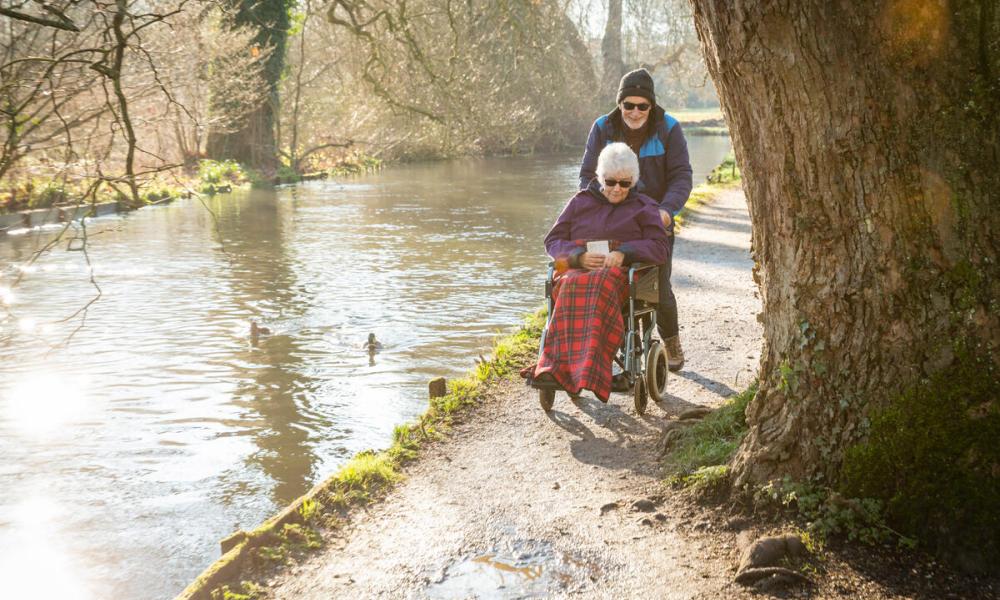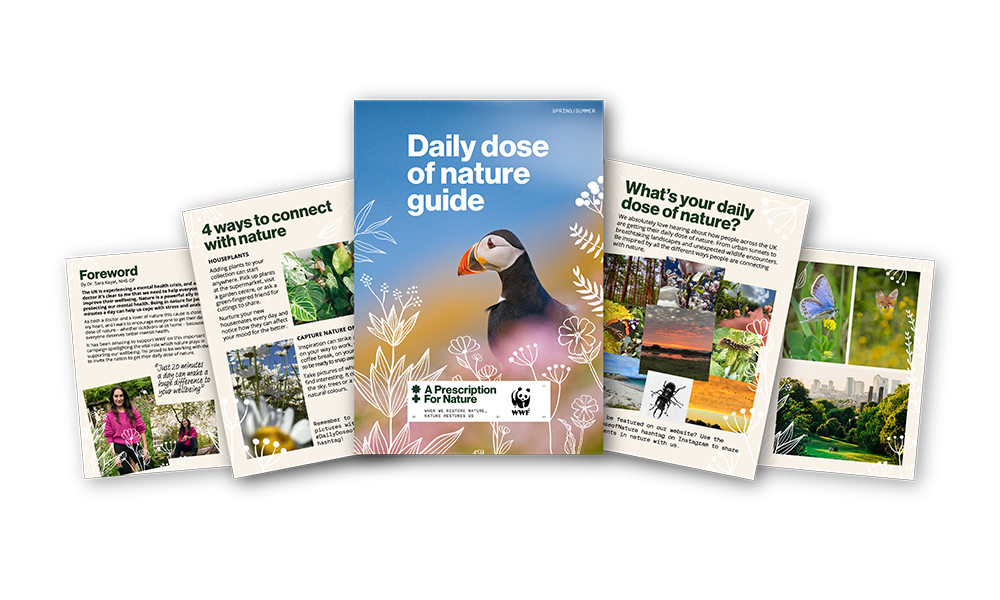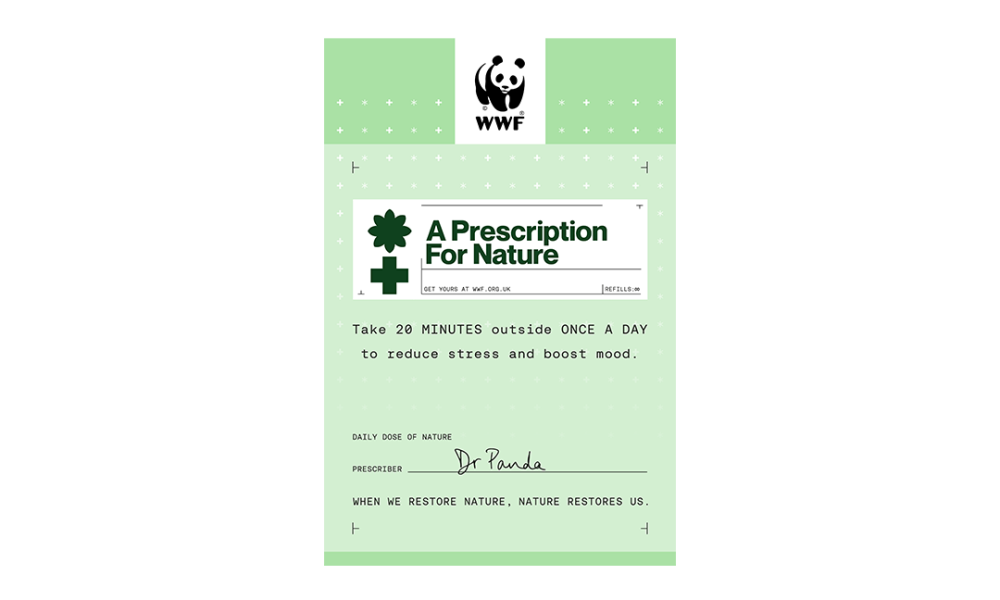
Nature can nurture
Nature can nurture
There are lots of reasons why we might not be able to spend as much time in nature as we’d like to. But, whatever may be going on in our lives, nature can benefit all of us, if we let it.
Even something as simple as observing nature from a window, and challenging ourselves to notice things we might have otherwise missed, can begin to change our outlook for the better. When we engage all our senses in activities like this, our awareness and appreciation of what’s around us quickly grows. It shows us that there’s a lot more in reach than we realise.

Sensory escape
Sensory escape
However you want to interact with nature, getting your daily dose can be done on your own terms, in your own time and in your own space. You could, for example, choose to listen to calming natural soundscapes on your commute, flood your room with floral scents, or mindfully observe sunlight dancing across your skin. No matter where we are, nature’s ability to uplift, inspire and restore us can never be overstated.
Get your daily dose
Sensory safari
We experience a lot more nature than we realise. With a bit of practice, we can increase our awareness of it and get better at using it to ground us. A sensory safari is one excellent way to do this. It’s an activity that can be done wherever you are, and is flexible enough to suit whatever time you have and is flexible to your abilities. Outdoors or in, you can choose to sit and observe, or move around at a gentle pace. When you’re settled, choose one (or more) of your available senses and hone in.
What can you hear?
Tune in to the symphony of nature and try to pick out three individual sounds in your environment – birdsong, running water, wind. See if you can identify where each one is coming from.
What can you smell?
Take some deep breaths in through your nose. What natural scents can you detect? You might discover the sweet, floral scent of flowers, fruity notes from nearby food, or the fresh smell of falling rain.
What can you feel?
Reach out and touch three natural things – a shell on your table, a soft flower petal, a smooth pebble, or the surrounding grass. Notice their different textures and take a moment to reflect on how each one makes you feel.
What can you see?
Look out and choose three natural things in your view – a single flower, a bird, insect, or cloud. Focus on them one at a time and consider their shape, colour and size. Can you imagine what they’d be like to touch? Do they connect to each other in any way?
Because our environment changes so often, you can do this activity daily and get different results every time. It’s especially rewarding to see what new things your senses detect as the seasons come and go.
By opening our eyes to the world around us, sensory safaris help to grow our understanding and appreciation of the nature that surrounds us.
Cook along with the seasons
Cooking with the seasons can be as simple as enjoying strawberries in summer and a bowl of pumpkin soup in autumn. It’s a wholesome, healthy way to stay connected to nature’s cycles and an excellent reminder to slow down once in a while.
Next time you go shopping:
- Look for foods that are fresh and in season – pop plenty of these in your basket.
- Seek out foods that are naturally colourful and have interesting shapes – wonky veg is just as good for us as any other.
- Try different varieties of your usual buys. When we tune in to what’s available, or plentiful, we notice how much can change throughout the year.
- It’s exciting to taste new fruits and vegetables you’ve never tried before – why not add some to your selection and discover a new favourite?
- If you can find foods that are grown closer to home, that’s even better. It means they’ve travelled fewer miles to get to you. There should always be some sourcing information available on the label, or in the product description if you’re shopping online.
After you’ve gathered your ingredients, take the opportunity to enhance the experience with some simple sensory observations:
- As you prepare and eat your dish, tap into your senses.
- Notice how your ingredients look, smell and taste on their own. Then, how they change when you bring them together in a whole dish.
- Ask yourself: Which ingredients stand out most? Does their texture remind you of anything else? Which flavours are your favourite?
This mindful way of making our food can bring even more enjoyment to an activity we often do on autopilot every day.
Seek out the sun
Sunlight has a superpower when it comes to our mental health. Its serotonin-making rays can energise us, focus us, and make us feel happier overall.
Whether you’re an early bird or a night owl, choosing to start or end your day with the sun can be a wonderfully calming activity. You can do this inside (from a window) or outdoors. All you need is a view and a few moments to sit back and watch.
- Set your alarm for the ‘golden hour’ (the first hour after sunrise and the last hour before sunset) and settle in with plenty of time to enjoy the spectacular colours of the changing sky.
- Gaze upwards, outwards and into the distance. How far can you see? What can you spot? After a few minutes, close your eyes, take a few breaths and reopen them.
- Has the changing light changed anything about the scene in front you? Has your mood shifted as day turned into night, or vice versa?
Simple as it is, this quality time with the sunshine can put you in a great frame of mind for the day ahead, is a brilliant way to relax your mind before bed. Don’t be put off entirely if the clouds get in the way – watching the weather is still a great exercise for settling our minds.
Remember that sunshine safety is very important! Never look directly at the sun and always protect your skin with sunscreen.
Wonder at the weather
If we’re feeling tired or low, embracing the weather is a brilliant way to liven up our minds. If you’ve been inside for a while, try gazing out of a window and seeing what the weather’s up to. A few moments observing the sky can be a welcome reset during a stressful day.
- Find a quiet, comfortable spot by a window.
- Look up at the sky and take a few deep breaths.
- Let your shoulders and the muscles in your face relax.
- Observe your view, without judging what appears. Notice the colour of the sky and shapes of the clouds. Are there different kinds? Are they moving at different speeds? How many can you count? How far can you see into the distance? Is the weather different further away?
- After a few minutes, bring your attention back into the space around you.
If you’re able to go outside, the change of scene will help enhance this exercise by waking up your senses even more.
Just as the weather affects us, it affects our environment, too. Think about the leaf piles left during autumn, or the unexpected places puddles appear. Becoming aware of these weather signs is not only a helpful mindful exercise, but an eye-opening one that can positively change our relationship to the world around us.
Listen to soundscapes
For a simple but seriously effective dose of nature, listen to some natural soundscapes.
These audio recordings of the natural world are soothing to our soul and can encourage our mind, muscles and heart rate to relax. Take some quiet time for yourself and tune in.
- Select a track that appeals to you. You can choose from wild environments like rainforests, woodlands and open seas, or surround yourself with storms, birdsong or the gentle crunching of autumn leaves. Explore our Soundscape series on YouTube for more.
- As you listen, see if you can notice patterns. The slow, steady rhythms of wind, rainfall and waves can be of great comfort to us.
- Reflect on what sounds stand out to you, or if any hold more meaning than others. Certain sounds can trigger happy memories of times we spent in nature in the past.
If you don’t have time to sit quietly, you can use these natural soundscapes as a backdrop to your day.
- While you go about your to-do list, take 30 seconds to listen in, pick out three sounds, then carry on with your tasks.
- If you’re a podcast listener, or stream music regularly, try swapping in wild sounds once a week to see what effect it has on your mood.
- If you can wear headphones while you work, inject a ‘green power hour’ into your morning or afternoon.
- At the end of a long day, lie down and let the sounds of nature send you off to sleep.
Meditate with nature
While meditation has all kinds of relaxing benefits, adding nature into the mix can calm us even more. If we’re seeking a mindful escape, guided nature meditation can transport us to jungles, forests, oceans and deserts all from the comfort of our own home (or wherever we take our headphones).
- It involves listening to a recording and following some simple instructions.
- A gentle voice will guide you on a journey and direct your attention to different sounds you hear. These could be things you recognise, like birdsong, rustling leaves, or running water. They could also be more abstract, like high-pitched notes or deep, vibrating chords.
- You might be encouraged to use your imagination to feel sensations like warm sunshine or a soft breeze. Your body may also respond to these, which is a sign of your mind’s amazing power.
Our guided meditation ‘Step into the Forest’ with Miranda Richardson is a great place to start.
Try to incorporate a meditation session, however long or short, into your daily routine. It’s a flexible activity that can be done anytime, anywhere. Try it during a commute (as long as you're not driving, of course), over a cuppa, during a lunch hour or right before you go to bed.
"I have mobility issues, but this has encouraged me to make the effort to sit outside for twenty minutes; to look and listen to the life arrived me. There’s always something to catch a glimpse of that makes me smile."
WWF supporter














